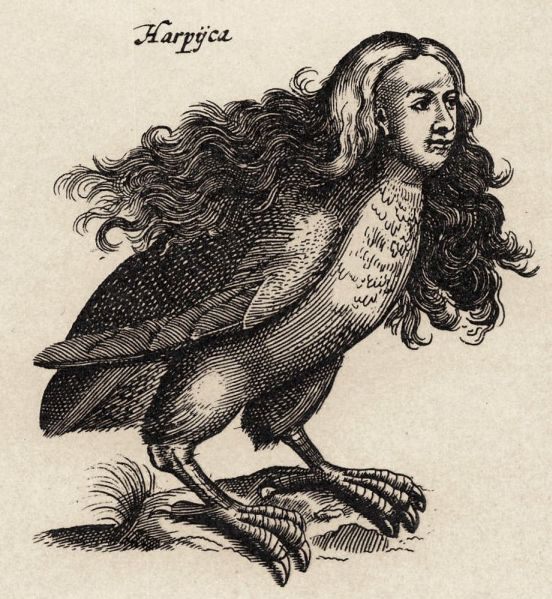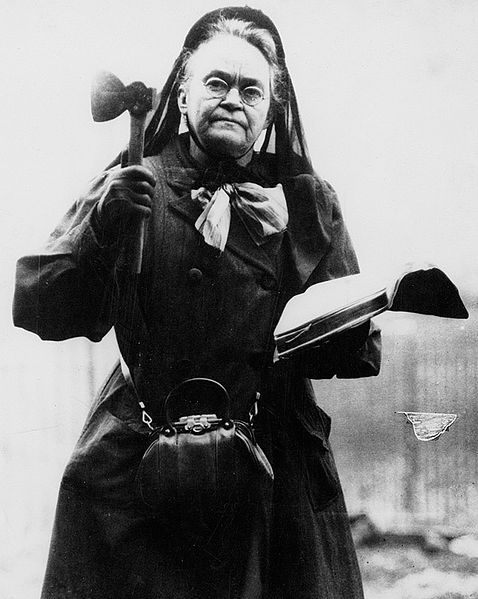Just Like Feminist, Fishwife Was Supposed to Be an Insult

A harpy in Ulisse Aldrovandi’s Monstrorum Historia, Bologna, 1642. (Photo: Public Domain/WikiCommons)
In the classic 1950 film All About Eve, venerable actress Margo Channing (played by Bette Davis) sails onto the set of her latest production, where her plotting assistant, Eve, has just procured the role of her understudy. Margo feigns ignorance, then wheels on the playwright, Lloyd, letting it drop that a meddling drama critic had tipped her off to the scheme. As it dawns on Lloyd that he’s walked into a trap, he reaches for most cruel and cutting remark possible and shouts, “You’ve been talking to that venomous fishwife, Addison deWitt!”
Fishwife?
According to the Merriam-Webster Dictionary, a fishwife is, first, a “woman who sells fish.” Ok, that makes sense. But things go astray quickly. Second, she is a “rude and rough woman” or a “vulgar and abusive woman”. Google “fishwife” and the internet will tell you she is “a coarse mannered woman who is prone to shouting.” The Macmillan Dictionary declares her “a woman who speaks loudly in a rude voice”. Dating back to early modern times, almost as quickly as the word “fishwife” was recorded, it became a go-to slur for any broad considered uncouth and mouthy.
The fate of the word fishwife is troubling—even downright infuriating—but not unique. Take the word “virago”. According to the OED, the first recorded reference surfaces in the year 1000, and it meant simply “woman”. By the 1300s it meant a heroic female warrior but was also used to describe “a bold, impudent or wicked woman”. Today Merriam-Webster defines a virago as “an angry woman who often complains about and criticizes other people”. The first definition of a hussy was a “mistress of the household; a thrifty woman”. The definition of a slut was always dicey, but at one referred simply to a kitchen-maid. The term battle-ax, which started popping up in 1800s, referred to formidable women, but not in a good way. They are difficult, domineering and aggressive—particularly older women. In fact, anything with the word “battle” in it seemed like a great way to slander to noisy broads. According to Cassell’s Dictionary of Slang, “battleship”, “battle-cruiser” and “battler” were all used similarly.
But the history of this specific word spans continents and hundreds of years. Why exactly, did such a fate befall women who just wanted to sell some fish?
“Fishwife” first pops up in the Oxford English Dictionary in 1523. (A picture of restraint, the OED defines fishwife as simply “a woman who sells fish”.) The term was used throughout Europe, but especially in the British Isles, and eventually it made its way overseas to the United States, too.
Art historian Alena Buis has spent some time thinking about fishwives, specifically visverkoopsters, or Dutch fishwives. In 2012, along with two English language scholars, Buis convened a workshop around depictions of fishwives for the Attending to Early Modern Women conference at the University of Milwaukee.
Dutch fishwives, it turns out, were taking care of business.

Detail of fishlass from Winslow Homer’s “Inside the Bar”, 1883. (Photo: Public Domain/WikiCommons)
“The Dutch provinces were seafaring,” says Buis. “While the husbands are away, the women have to take on a greater role in the family business.”
They manned the stalls at the fishmarket, and because they were key to an economy where men were often absent, they had all kinds of powers that women in other countries weren’t granted.
“The women in the Dutch republic were able to own property, sign contracts, own their own businesses and represent themselves in court,” says Buis.
And frankly, this really freaked out visitors, especially the English. English merchants were “horrified” that Dutch fishwives were “speaking their minds and running businesses” says Buis.
Even worse, fishwives were going door to door with their wares and calling out to would-be customers. And who likes a loud, mobile, entrepreneurial lady?

1845 Scotland, Fishwife (Mrs. Flucker Of Newhaven, Shucking Oysters). (Photo: Public Domain/Wikicommons)
In England, the term fishwife is “invariably found in the context of swearing,” writes language historian Geoffrey Hughes in An Encyclopedia of Swearing. “As in the comment, “They abuse one another like fishwives,” recorded in John Davies translation of Olearius’ Voyage (1662).” The 1874 tome “The Slang Dictionary” reported that a “fishfag” was “orginally a Billingsgate fishwife; now any scolding, vixenish, foul-mouthed woman”. A 1902 article in Scribner’s Magazine described the women who worked at the Billingsgate Fish Market in London as having brawny arms and a “thirst for gin, her shrewd gibes, her ready pipe and her more ready repartee, her torrents of invective.”
The “scolding fishwife” and to “gossip like a fishwife” became common tropes. And while this probably perturbed a fishwife or two, it also makes for colorful historical reading. In 1893, several U.S. newspapers published a short (fictional) story called “O’Connell and the Fishwife.” “Go rinse your mouth in the Liffey, you nasty ticklepitcher,” O’Connell tells the offending fishwife. “After all the bad words you speak it ought to be filthier than your face, you dirty chicken of Beelzebub!”
In a 1948 United Press profile of Fannie Feinberg, “the oldest lady fishwife” at New York’s Fulton Fish Market, the subject—who had been peddling fish for 50 years—declares she will never hawk fish like a Billingsgate fishwife. “It’s no way to sell fish, shouting abuse at the customers. Better not to sound like a fishwife if you want to be a success,” she says.
Even the fishwives were maligning the fishwives.

Carrie Nation, 1910. (Photo: Public Domain/WikiCommons)
But even as the word morphed into an insult, there were still those who celebrated fishwives. The fishwives of Cullercoats in North East England were a favorite subject of the artist Winslow Homer, who depicted them as stoic hard-workers. The fishwives of Newhaven, Scotland were also muses for writers and artists.
So are there any contemporary examples of words that have suffered the same fate as fishwife? Buis considers this question for a moment. Language is always in flux, but fishwives have remained a trope way past the days when fishmongers were common sights. When Bush locates the word, it seems all but inevitable.
“Maybe it’s a bit of a stretch,” she says, “but I think in contemporary terms the word ‘feminist’ is quite similar.”








Follow us on Twitter to get the latest on the world's hidden wonders.
Like us on Facebook to get the latest on the world's hidden wonders.
Follow us on Twitter Like us on Facebook